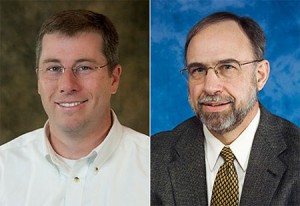Lecture to Weave Information Technology With Environmental Views
Wednesday, April 9, 2014
Pennsylvania College of Technology faculty members D. Robert Cooley and Mark D. Noe will present a session on technology and environmental ethics on April 22 as part of the college’s Centennial Colloquia Series.
Titled “Google Meets Aldo Leopold: Information, Technology, and 21st-Century Environmental Ethics,” the presentation by Cooley and Noe will define environmental ethics through Leopold’s perspective and then consider the multiple viewpoints modern technology brings to our understanding of the issues.
Leopold, a professional forester, ecologist and writer in the early days of the U.S. Forest Service, wrote “A Sand County Almanac,” a collection of essays focused on informing the general public of how the natural world works and inspiring people to take action to ensure the future health of the land and water that sustains all life.
 His foresight regarding the complexity of the human-environment interaction has been borne out – and it’s only been 65 years since he published the work.
His foresight regarding the complexity of the human-environment interaction has been borne out – and it’s only been 65 years since he published the work.
What he “saw” through his exploration of the natural world, we can now “see,” more clearly, thanks to recent technological advances, especially Google Earth.
With the visual evidence of Leopold’s predictions at our fingertips, Cooley and Noe explore: How should professionals – and everyday citizens – mesh Leopold’s ethic with the new possibilities offered by technology?
The lecture, scheduled at 7 p.m. in the Klump Academic Center Auditorium, is free and open to the public. In the spirit of all colloquia, a question/answer period will follow the presentation; the conversation can also continue during the reception that will follow.
Cooley is an assistant professor of anthropology and environmental science, and Noe is a professor of English.
Cooley holds a doctorate in ecological anthropology from the University of Georgia and a bachelor’s degree in biology from Bucknell University. He has recently given presentations at conferences including the Society for Applied Anthropology, the Penn State Teaching and Learning with Technology Conference, and the Global Penn State Internationalizing the Classroom Conference. He has been a member of the Penn College faculty since 2003.
Noe holds a doctorate in 19th-century studies from the University of Illinois at Urbana-Champaign. His writings have appeared in a variety of publications, and he is currently the nonfiction editor of Aethlon: the Journal of Sport Literature. He has been a member of the Penn College faculty since 1999.
Penn College presents the Centennial Colloquia Series in celebration of 100 years of education on its campus. The series features presentations by nationally known authors and Penn College faculty that will challenge our thinking about the impact of technology on the past, present and future.
For more about the college, email the Admissions Office or call toll-free 800-367-9222.
Titled “Google Meets Aldo Leopold: Information, Technology, and 21st-Century Environmental Ethics,” the presentation by Cooley and Noe will define environmental ethics through Leopold’s perspective and then consider the multiple viewpoints modern technology brings to our understanding of the issues.
Leopold, a professional forester, ecologist and writer in the early days of the U.S. Forest Service, wrote “A Sand County Almanac,” a collection of essays focused on informing the general public of how the natural world works and inspiring people to take action to ensure the future health of the land and water that sustains all life.
 His foresight regarding the complexity of the human-environment interaction has been borne out – and it’s only been 65 years since he published the work.
His foresight regarding the complexity of the human-environment interaction has been borne out – and it’s only been 65 years since he published the work.What he “saw” through his exploration of the natural world, we can now “see,” more clearly, thanks to recent technological advances, especially Google Earth.
With the visual evidence of Leopold’s predictions at our fingertips, Cooley and Noe explore: How should professionals – and everyday citizens – mesh Leopold’s ethic with the new possibilities offered by technology?
The lecture, scheduled at 7 p.m. in the Klump Academic Center Auditorium, is free and open to the public. In the spirit of all colloquia, a question/answer period will follow the presentation; the conversation can also continue during the reception that will follow.
Cooley is an assistant professor of anthropology and environmental science, and Noe is a professor of English.
Cooley holds a doctorate in ecological anthropology from the University of Georgia and a bachelor’s degree in biology from Bucknell University. He has recently given presentations at conferences including the Society for Applied Anthropology, the Penn State Teaching and Learning with Technology Conference, and the Global Penn State Internationalizing the Classroom Conference. He has been a member of the Penn College faculty since 2003.
Noe holds a doctorate in 19th-century studies from the University of Illinois at Urbana-Champaign. His writings have appeared in a variety of publications, and he is currently the nonfiction editor of Aethlon: the Journal of Sport Literature. He has been a member of the Penn College faculty since 1999.
Penn College presents the Centennial Colloquia Series in celebration of 100 years of education on its campus. The series features presentations by nationally known authors and Penn College faculty that will challenge our thinking about the impact of technology on the past, present and future.
For more about the college, email the Admissions Office or call toll-free 800-367-9222.
